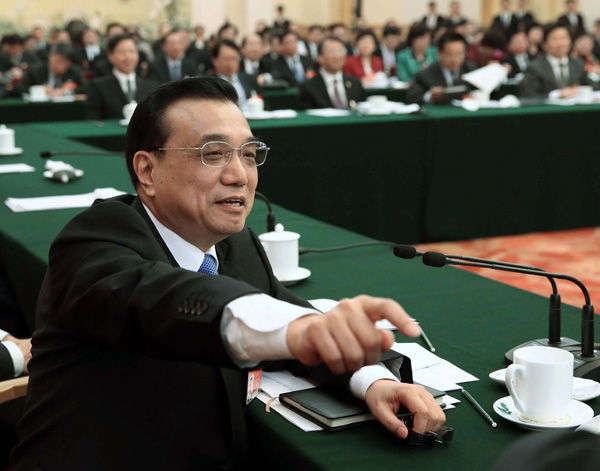Li expounds on new normal in plain style
By Li Yang (China Daily) Updated: 2015-03-07 09:15
 |
|
Premier Li Keqiang invites an NPC deputy from Shandong province to give his opinions of the Government Work Report on Friday. Li extended a meeting to hear from Wang Tingjiang (right), who had raised his hand as the meeting was closing. Wu Zhiyi / China Daily |
Premier Li Keqiang delivered the Government Work Report on Thursday during the annual session of the National People's Congress, China's top legislature, in which he detailed the difficulties confronting the country's development, and, more importantly, the government's confidence in the strategies outlined to resolve the problems.
The report drafters, under the direct leadership of Premier Li, adopted a new structure for this year's report. Unlike previous Government Work Reports, which have usually consisted of three sections - namely the achievements made over the past year, the work for the year ahead, and the key tasks to be done - the report this year was made up of six sections: the achievements and problems faced over the past year, the work for this year, reform and opening-up, economic growth, people's livelihoods, and government modernization.
"This was because the last four sections are so crucial that they each deserved to be an independent part of the report," said Ning Jizhe, head of research department of the State Council, China's Cabinet. Ning and the research department have rarely been in the spotlight before; and his appearance in an explanatory news conference Thursday noon, the first of its kind, was a sign of the Chinese government's growing openness and transparency.
As explained by Ning, the writers solicited advice from foreign experts in China - from six countries - and also suggestions from the hundreds of county heads studying in the central Party school in Beijing when they drafted the report, whose performance is of great importance for the good governance of the world's most populous country as they are basic functionaries implementing the central government's policies. The writers sent more than 4,000 draft copies of the report to grassroots government departments. And the report was modified many times.
If an article and the way it is written show the writer's personality and thinking, the report's refreshingly short sentences and colloquial style and its new framework reflect the new leadership's desire to cut bureaucracy and the efficient working style they are promoting.
- 'New Normal' is not bad for China, says Dutch reporter
- Steady as she goes for the new normal
- Top political advisor highlights 'new normal' adaptation, Party discipline
- Currency fluctuation 'completely normal'
- Highlights on the Internet industry in Premier Li's work report
- Work report signals change in family planning policy
- Caution and commitment in Government Work Report
- Infographic: Highlights of premier's work report

I’ve lived in China for quite a considerable time including my graduate school years, travelled and worked in a few cities and still choose my destination taking into consideration the density of smog or PM2.5 particulate matter in the region.











